Short Note:Been having a bit of sickie lately. Hence the delay in posting. PMS getting more and more serious these few years. Sigh.Continue from
Part 1.
Where were we?
O. Yes. So baby started packing while I just waited patiently, hoping that the taxi would arrive on time. I booked the taxi a day earlier and even made the call to confirm that everything was alright and that the taxi would arrive at 8:45am sharp.
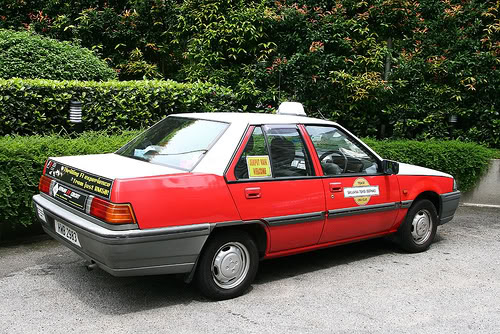
Which is why I am telling you right now never book this site that claims itself to be LCCT taxi online. It's a fake! STUPID taxi didn't bloody show up.
But thank god I have my car with me so after 15 mins of no show, we drove to the airport.
Luckily nothing was to go wrong since that little incident. I was worried that a bad start could lead to many bad followings along with the surprise.
Then my baby started getting paranoid and throwing me with tons with questions like:
"Where are we going? I didn't change any money. What currency do we need?"
"Are you sure we didn't need anything?"
"Omg. This is crazy. OMG OMG OMG"
etc.
Where to every single question I replied with a confident: "Don't worry. Everything is taken care of (by me)."
Haha. First time feel damn in control.
Well I should. I've already taken three weeks to make sure I have everything with me. Foreign currency (yep meant the expense would be all on me), itinerary, and even adapters for phones.
We arrived at the airport in 45 mins time, where I led him to the international departure check-in counters where he would, for the first time, see his surprise destination.

So before that, I casually moved him to chill with me at Chocolate Lounge, you know, pretending that I needed to rest for a while.
Where I asked him to open his second stack of cards.
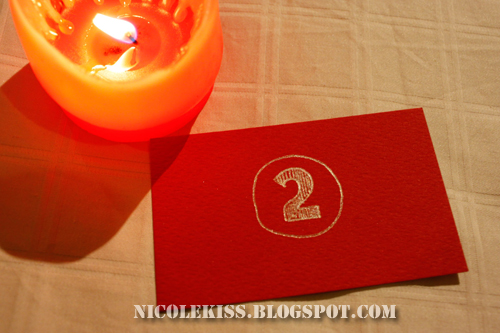

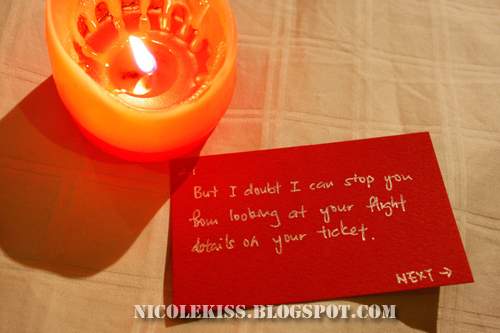
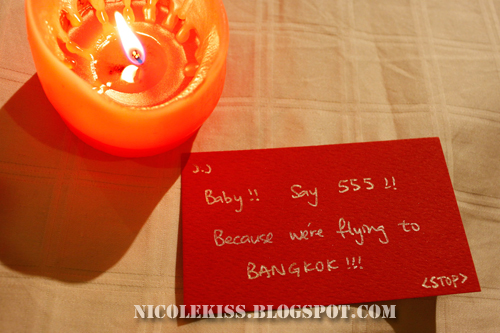 "555" in Thai are pronounced at Ha Ha Ha. Something he learnt from his last trip.
"555" in Thai are pronounced at Ha Ha Ha. Something he learnt from his last trip.
Yep. The check-in counter displayed:
BANGKOK.Now my baby has only ever been to Bangkok once in his life and it was with me, and he loved it. It then became his favourite city of all time and always wanted to go back there.
But the thing is, if the surprise was so predictable, it wouldn't be called a surprise would it?
 blur blur baby, hehe
blur blur baby, heheSo while he was shouting: "No way! No way!" and leaping everywhere in joy thinking that he's visiting Bangkok, I was holding it in with a smile plastered on my face.
It's hard to control not to blurt out everything you know.
By 10:30am, we boarded the plane.
11:00am. Plane departed.
At this point, I think he said something like: "OMG we are really doing this, aren't we. OMG we are flying. OMG OMG OMG."
12:30pm. It was cue for 3rd stack of cards.
I was beginning to like this game.
It read:
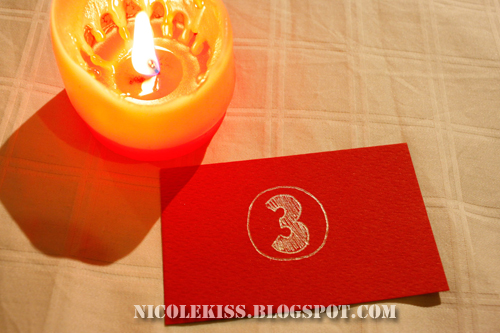
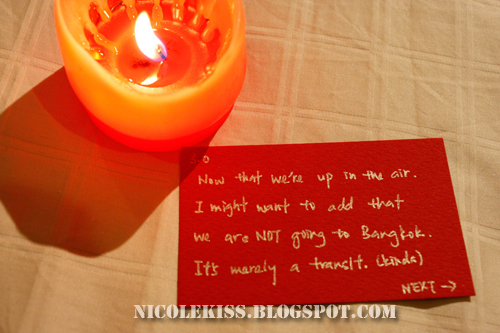
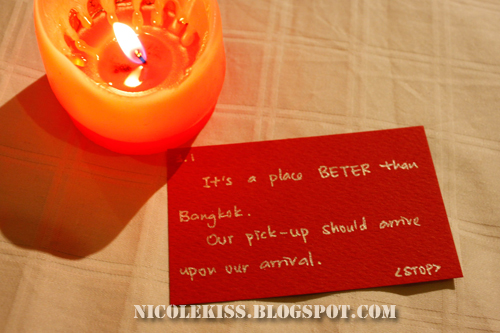
And it did. As planned, pretty Noi-Nha arrived no sooner had we stepped out of the arrival hall of the Bangkok International airport in her car, with her driver.
Noi-Nha informed us that the journey would take 3 hours (which I already knew) and even then, baby still has NO IDEA where we were heading to. Muahaha.
2 hr 30 mins later. We were crossing through a secluded area that looked like a jungle.
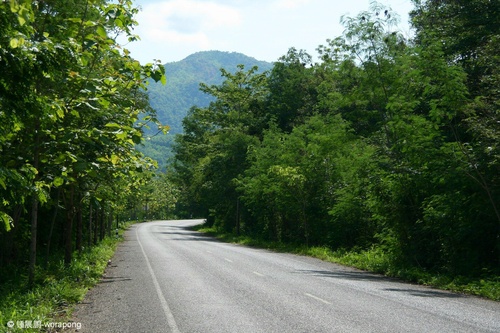
Baby was beginning to doubt the surprise, so he whipped out his phone to check on the GPS location. Turning out we were heading straight towards the Burma border, east direction away from Bangkok.
He even laughingly joked that I was bringing him to Burma to sell, but I could see that he was really worried if that was true.
As the car made a turn, an vast field of endless green swept into view, as if we never drove through jungle-like road before.


The car brought us, pass the farm house, straight to the cutest reception one would ever lay eyes on.
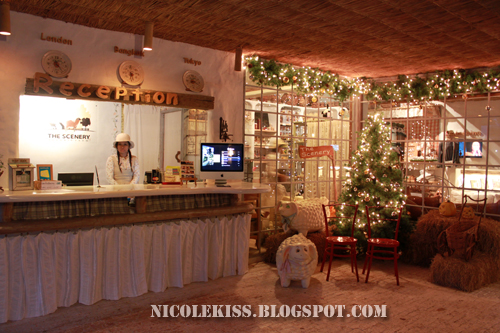
We had our welcome drink here while waiting for the keys to our villa.
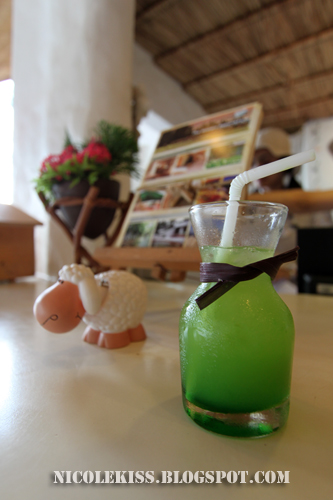
By now, baby was just going with the flow, flattered by the beauty of the green field but didn't look too impressed.
But then we hopped onto a buggy which chauffeured us right to this little greek-style modest looking villa, where I led him open the door for his ultimate surprise.
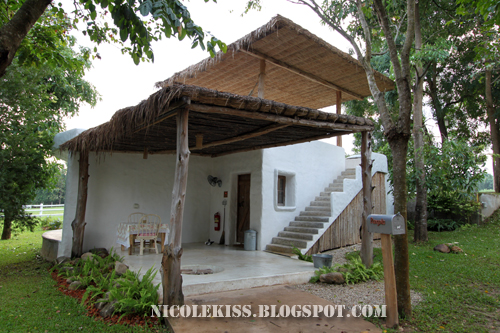
Now this was where it took his breath away, almost literally.
The interior view... of our villa.
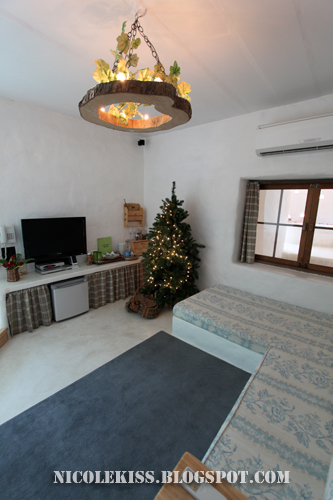 the living area - where you find a flat screen, ipod dock, mini bar, food menu, etc.
the living area - where you find a flat screen, ipod dock, mini bar, food menu, etc. our bed, overlooking the field
our bed, overlooking the field
 bedroom view at night
bedroom view at nightThe villa was designed in such that it's always Christmas season around here.

Then I took him to see the toilet.
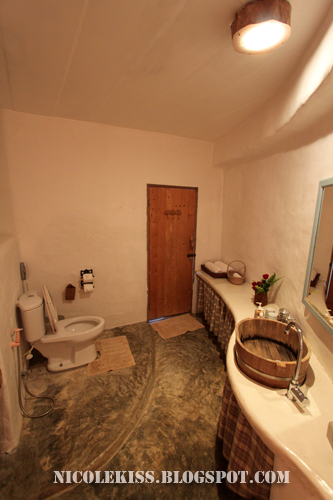
Where you'd find a corridor...

... connecting to the main piece of the villa - the biggest home jacuzzi I've ever sat in.

 Don't be fooled by the wide-angled photo, but a 5'7"adult could lie on the bottom of the jacuzzi flat from head to toe.
Don't be fooled by the wide-angled photo, but a 5'7"adult could lie on the bottom of the jacuzzi flat from head to toe.Roses and red wine in bucket was prepared for us.

That's not all. I then brought him outside the villa, where one would find a stone staircase next to the door.

He climbed up to find a root-top rest place.

A hammock for leisure, a bed for... er... outdoor activity :p , a dining table for your daily meals and a BBQ set.
Not only that, the root top was also overlooking the vast green field, which was actually a farm, with only two cows.

Folks. This place is Scenery. Almost the most amazing boutique villa resort I have ever been in my entire traveling life. Located in the most unusual place, far away from the city, hidden in total seclusion (location to be revealed). Nothing can beat a better romantic getaway location.
What I loved about this place was the attention to details the owner has put in.
How everything was perfectly cute, perfectly convenient, and perfectly comfortable.

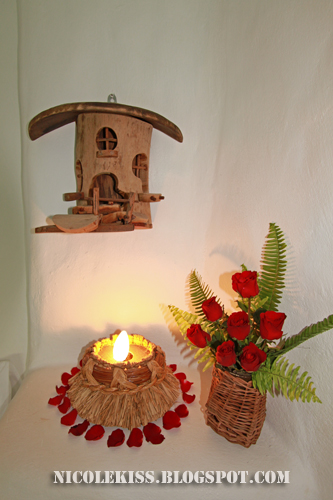
Just bring your own Ipod and you can play your favourite list of songs.
As for my baby, well, I think it's safe to say that he died and went to heaven.
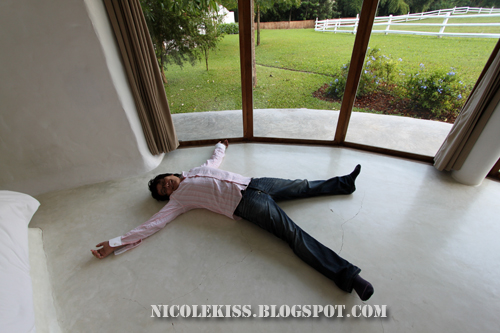
By now he turned to me and said: "I can't believe just a few hours ago I was just sleeping soundly on my bed back in Malaysia! This is like a dream!".
I don't know about you, but I think that's the most flattering comment a "surpriser" can ever receive. Made me wanna *gloat*
It was time for his fourth stack of cards.
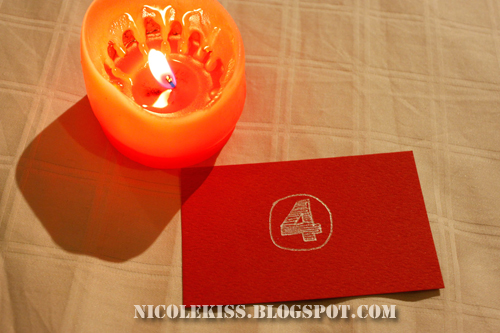
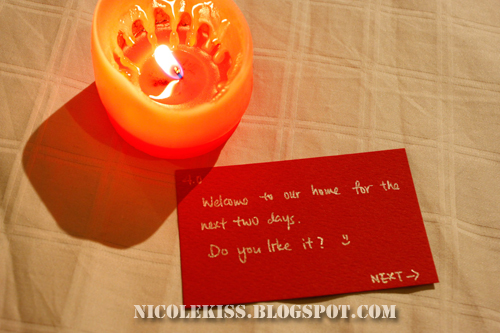
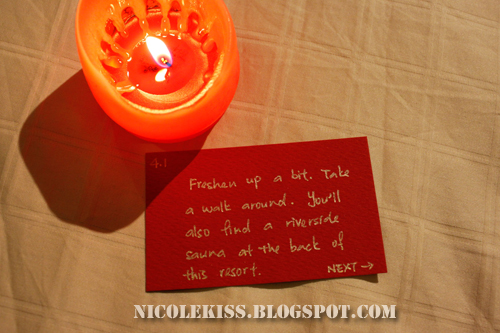


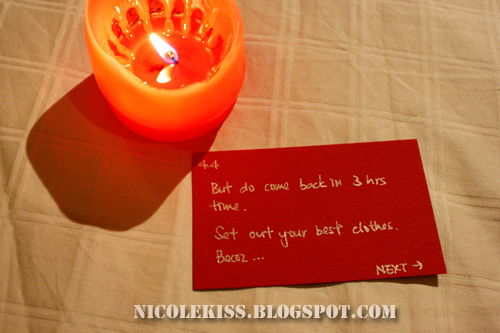
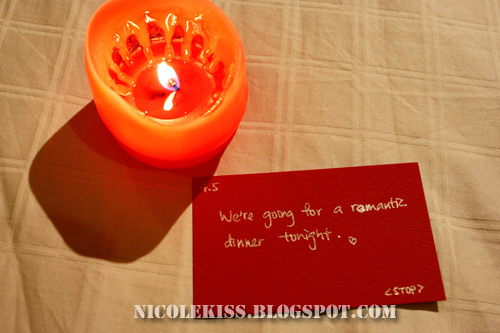
The surprise didn't end there (like I would let it end just like that). In fact, it was just about to begin.
Behind the resort, you'd find this really cute natural stream where you can play on swings and splash around the water,
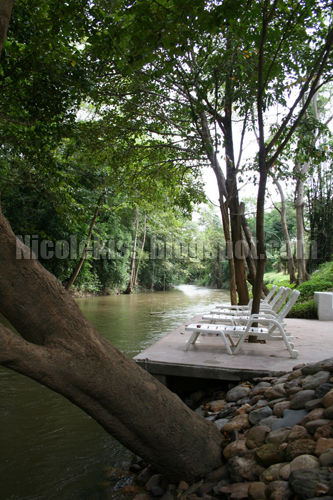
or even go for sauna or outdoor jacuzzi.

The stream (rather than river) really added to the quaintness of the place.
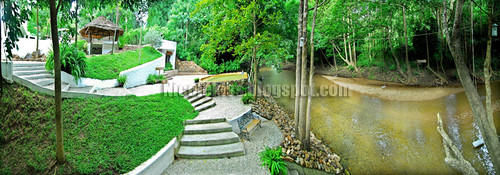
That evening, we dressed up in proper dinner wear (just for shits) and had our first dinner in Thailand - Thai Western fusion cuisine.

Now I know it sounded cheesy to have fusion menu, like almost every other restaurants these days are of fusion or some sort, and more often than not, they failed terribly to produce really compatible dish that were fit to be called fusion.
If there's ever one place I would recommend combining an Asian cuisine with western style, it's definitely here - Honey Scene Restaurant.
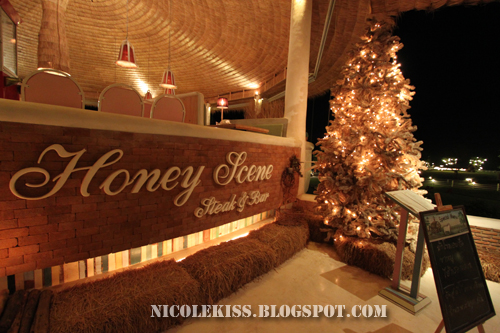
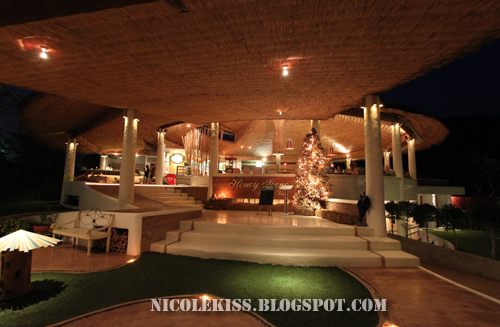 buggy dropped us off at the entrance.
buggy dropped us off at the entrance.We chose a table next to the farm so we could enjoy the evening view.
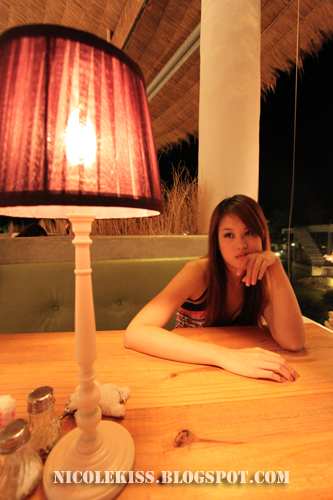
Which was quite spectacular.
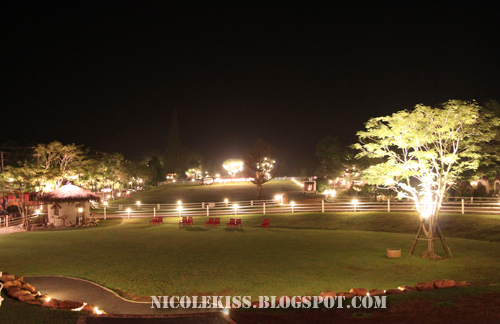
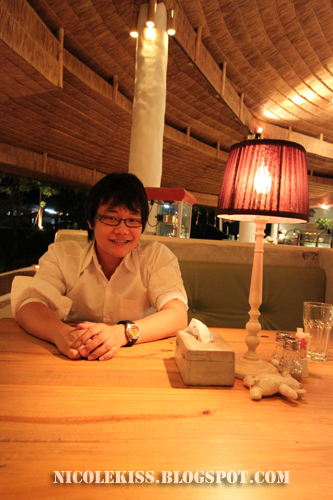 baby xoxo
baby xoxo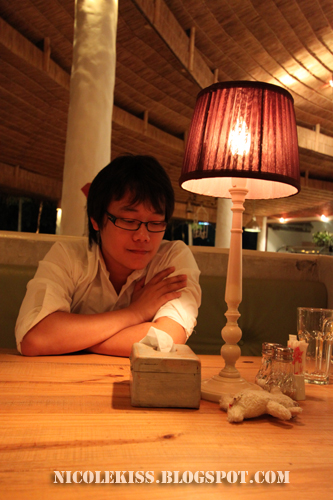 emo pic
emo picSince I've come here and tried and tested the food before, I knew exactly what to order.
 Thai Milk Tea (I have to have this every time I hit Thailand) & Beer (the man's drink)
Thai Milk Tea (I have to have this every time I hit Thailand) & Beer (the man's drink)I loved most of the dish served in Honey Scene, but my two all time favourites have to be:
Salmon Tom Yum Gung
trust me on this one, it WILL BLOW YOUR MIND
And
Pork Chop.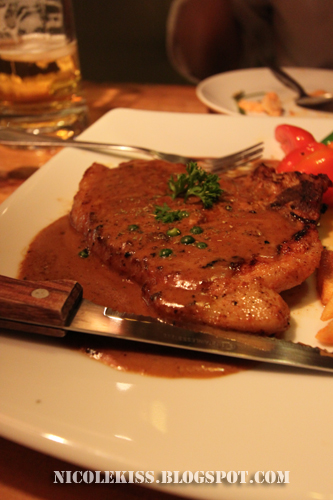 this would blow your pants off if your mind has been blown off with the first dish
this would blow your pants off if your mind has been blown off with the first dish(if you're ever here, don't bother asking the waitress for recommendation, they don't speak a lot of English, just order what I just mentioned, you won't regret it)
Dinner ended with lots of kisses and hugs, as we promptly left the restaurant and walked back to our villa hand in hand. (Decided to walk back under the stars)
 Honey Scene evening view from the farm
Honey Scene evening view from the farmBack at the villa, the fifth stack of cards awaited to be opened.
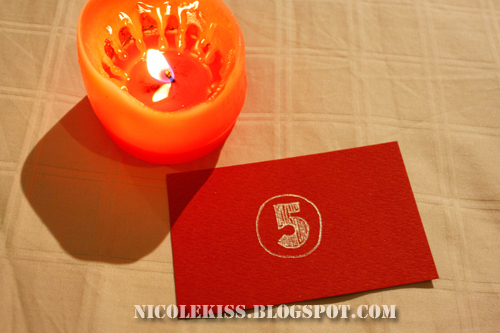
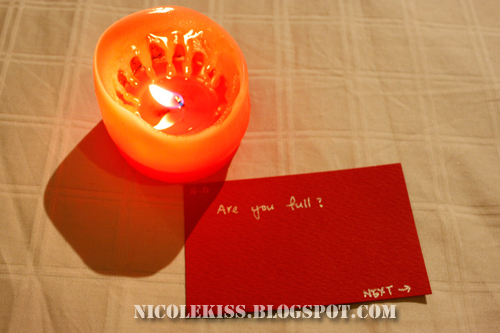
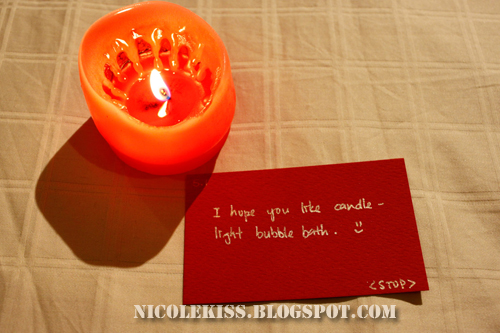
:)
(to be continued in
Part 3 of birthday surprise)
(location of resort
revealed here)
PS// The best has yet to come. ;)
 Same lunch for both kids today: organic red & yellow pepper "swords", Snap Pea Crisps, cream cheese & jam on whole wheat (cut into hearts today...since there's probably a limited window when my sons will let me cut their sandwiches into hearts without being mortified), strawberries, and a few cinnamon graham crackers. Then my older son also has a bag of Crispy Wheats tucked in the front of his bag for a snack today.
Same lunch for both kids today: organic red & yellow pepper "swords", Snap Pea Crisps, cream cheese & jam on whole wheat (cut into hearts today...since there's probably a limited window when my sons will let me cut their sandwiches into hearts without being mortified), strawberries, and a few cinnamon graham crackers. Then my older son also has a bag of Crispy Wheats tucked in the front of his bag for a snack today.

























































